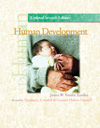 |  Human Development: Updated, 7/e James Vander Zanden,
Ohio State University
Thomas Crandell,
Broome Community College
Corinne Crandell,
Broome Community College
Late Adulthood: Physical and Cognitive Development
Chapter OutlineChapter 17 focuses on physical and cognitive development during later adulthood. Several topics are looked at in detail, including:
1Aging: Myth and Reality. The age at which an individual is considered elderly differs from one society to another. The demographics of the elderly are presented for various cultures. Why women live longer than men is discussed. A number of myths which cloud the real facts of aging are also outlined, and the overall health of elderly people is covered. In addition, the question of how the nation should allocate its resources among generations is addressed, as are programs for the elderly, such as Social Security. |
 |  |  | 2Health. Nutrition and health risks are discussed. |
 |  |  | 3Biological Aging. The physical changes associated with aging are presented, as are ways of combating the effects of aging through physical fitness. Various biological theories of aging are also examined. |
 |  |  | 4Cognitive Functioning. The first issue covered in this section is the varied course of different abilities. Results of studies on late-adult cognitive development and an overestimation of the effects of aging are presented. Research dealing with the memory processes, information processing, and learning in the elderly is also documented. The topics of senility and Alzheimer's disease are addressed. |
 |  |  | 5Moral Development. The importance of religion and faith are covered. |
|



 2003 McGraw-Hill Higher Education
2003 McGraw-Hill Higher Education